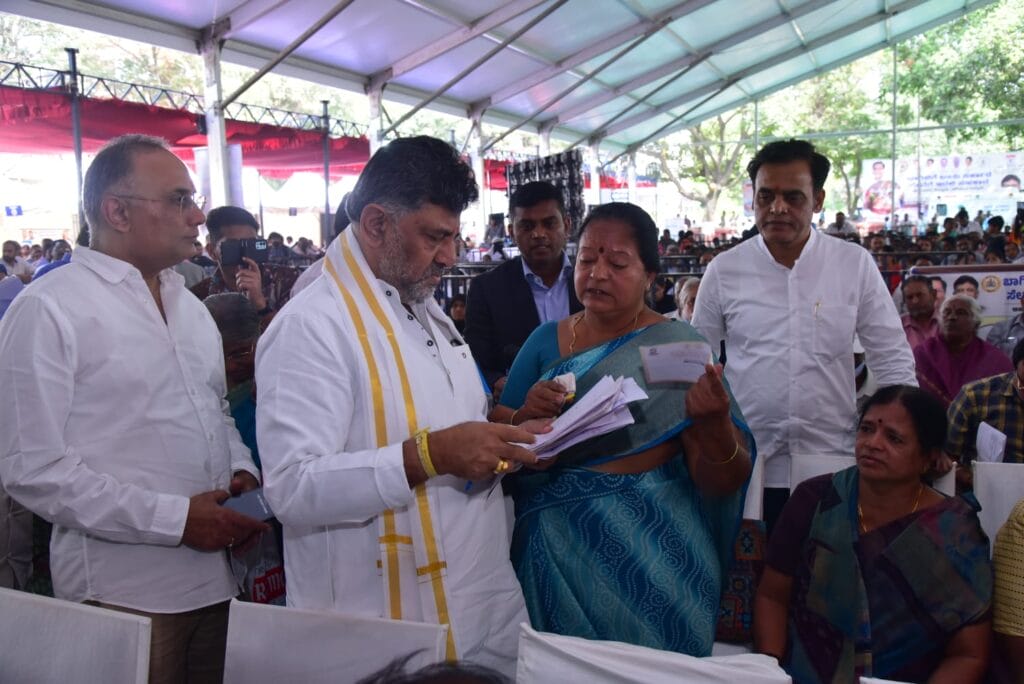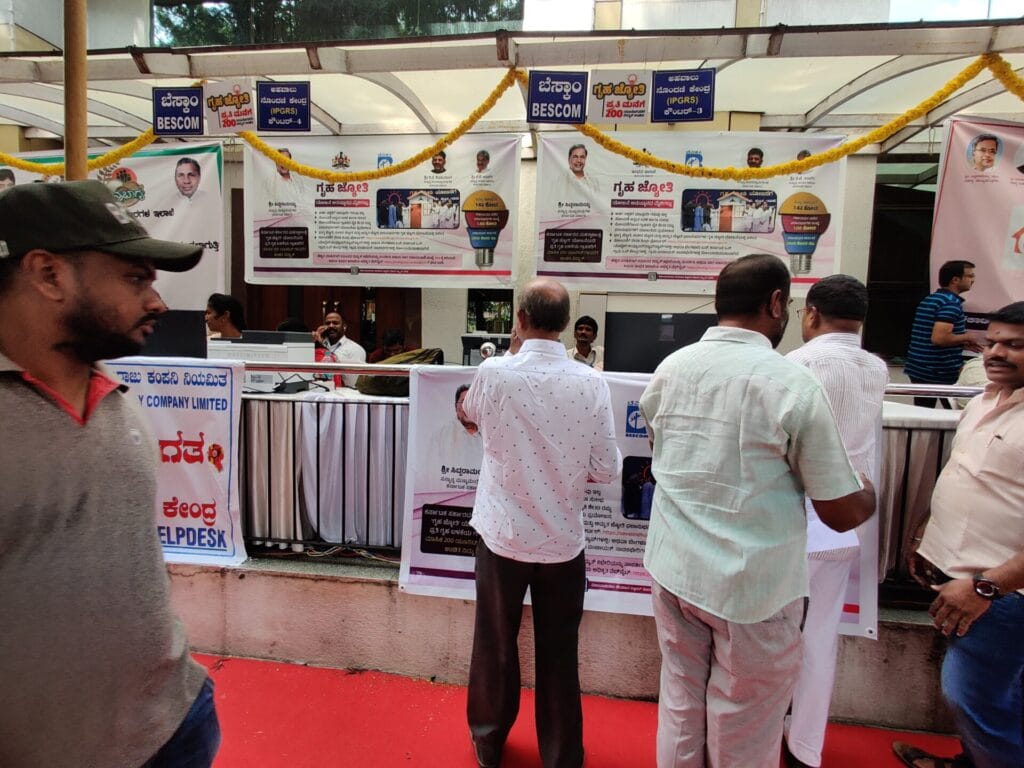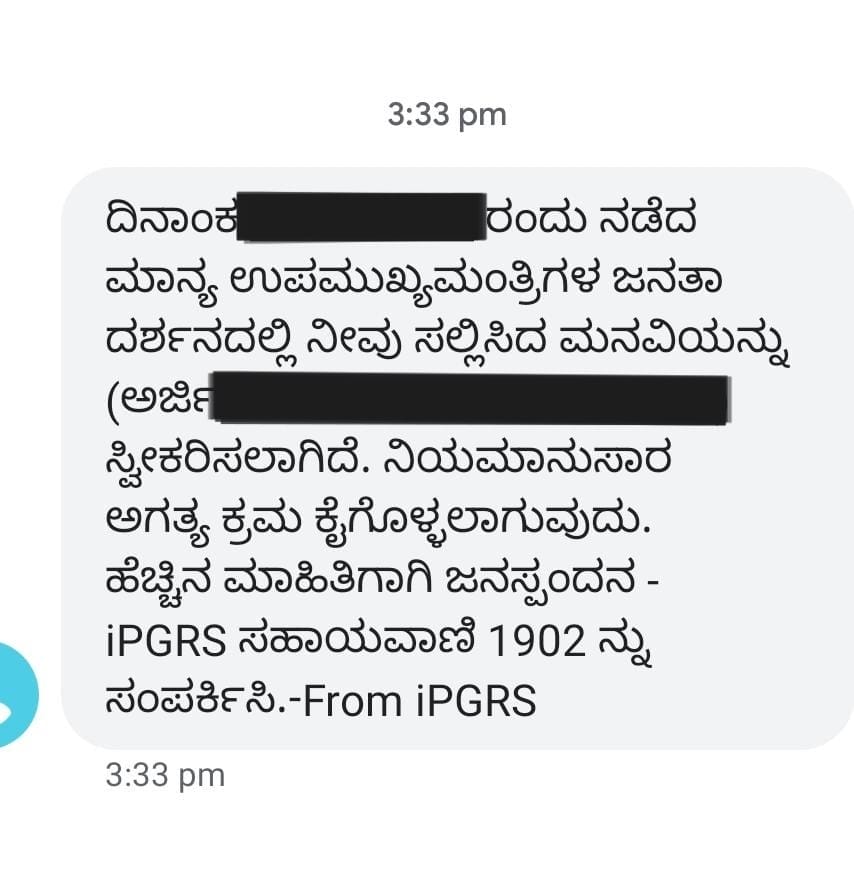With the aim of bringing the government to citizens’ doorstep, Karnataka Deputy Chief Minister and Bengaluru Development Minister, D K Shivakumar organised a 10-day Janaspandana programme in 10 constituencies, starting from January 3rd, this year. Grievances are registered on the spot and Shivakumar has promised to address the issues himself.
As per reports, nearly 4,000 complaints were registered from only two constituencies: K R Puram and Mahadevapura. The programme included access to officials from civic agencies like Bruhat Bengaluru Mahanagara Palike (BBMP), Bangalore Development Authority (BDA), Bangalore Water Supply and Sewerage Board (BWSSB), Bengaluru Metro Rail Corporation Limited (BMRCL), among other agencies. This arrangement makes it easier for citizens to directly bring their concerns to the officials in charge.
“The people of K R Puram and Mahadevapura have submitted their appeals to me. It is not possible to redress all the issues in one day. Drinking water, roads, sewerage and cleanliness would be taken up on a priority basis. Nodal officers would be appointed to oversee the works. Individual grievances will be sent to the respective departments,” Shivakumar told the media.

Well organised, but Congress schemes prioritised
“I got the first token at the Mahadevapura constituency since I arrived early, at around 8.30 am and there were around 20 counters, department-wise, to go and register your complaints,” says Valli Srinivasan, Bengaluru Apartment Federation (BAF) zonal in-charge of Varthur, Munnekollal, Marathahallli and Bellandur. She adds the programme was well organised with food, water and sanitation facilities. There were separate counters for women and the elderly.
“As a zonal in charge, I went with the complaints of making apartment life easier for the common people, as the licensing for so many facilities within apartments is expensive. I made a list of complaints and went with a total of about 55 different issues to discuss” she says.
A Resident Welfare Association (RWA) member, on the condition of anonymity, highlighted concerns regarding the organisation of a Khata mela, difficulty in paying taxes online and the lack of police patrolling over parked vehicles obstructing the footpath. “The event was well conducted. Our complaints were documented digitally, and we received an SMS with a registration number and an acknowledgement in about half an hour. However, it’s been almost a month and we have not heard from the officials yet.”
An association of about 80 RWAs from ward number 186 presented their list of concerns, a lot of which focused on builder issues and road development in their ward. They were sent to the specific departments for complaint acknowledgement, but again, post that, there has been no response.
Many people who attended the programme said that discussions on the government’s five schemes were prioritised over other issues.
A WhatsApp group named “Ward 46 Citizen Group” (whose new ward number has changed to 73 post delimitation) consisting of about 140 members, including residents and residents and officials of various BBMP departments, collaborate and discuss issues of the ward. Vidya Goggi, a member of the group and, on behalf of the Ward Committee Citizen Members, raised several concerns about solid waste management, black spots, CCTV functioning, stray dog shelters, and many other concerns.
The importance of BBMP elections
Valli believes that even though Janaspandana programmes help collect grievances directly from the public, without local ward committee meetings or corporators, its implementation will not be effective. Many who attended the programme, agree with this point of view. They want BBMP elections to be held as soon as possible.
Abdul Aleem, President of Changemakers of Kanakapura Association, says that the state government cannot solve every local issue and that is why local governance is required. “This was a good programme and could be an annual activity, but ultimately, the resolution of these grievances can happen only after BBMP elections,” says Abdul.
Vidya agrees and emphasises the importance of BBMP elections as per the 74th Amendment, which has not been held since 2015.
Srinivas Alavilli, Fellow, WRI India, who has worked on reviving ward committees in Bengaluru for several years, says such initiatives are ad hoc events for citizen participation and grievance redressal.
Srinivas says Bengaluru is the only big city in the country that conducts ward committee meetings and thousands have been conducted in the past with high success rates. “Now, because of assembly elections, ward committees have been stopped and citizens have lost their right to express their grievances at the local level. Since ward committees are supposed to be chaired by the corporators and the BBMP elections for the same have not been held, the ward committees cannot be considered legitimate. One of the success stories of local governance was when they decentralised COVID-19 management in the city during the pandemic. In spite of its obvious advantages, it is a shame that the BBMP elections have not been held for so long,” he says.
Follow-up of Janaspandana programmes essential
Vikram Rai, President of BAF, says that bringing multiple departments to interact with the public is good, since it is difficult for citizens to interact with officials on a regular basis. “The format of the programme was easy for citizens to follow, which attracted huge crowds at every event. However, it is important to wait and see how the follow up will be done.” Vikram emphasises that even though grievances are being registered in an organised manner via tech systems, this will not act as a replacement for ward committee meetings.
“The follow up of Janaspandana has to be assessed. Otherwise, it would end up like Brand Bengaluru,” he adds. He says that till the time corporators are elected, MLAs should take full responsibility to monitor the grievances that have been discussed at this programme, otherwise it is a waste of resources.
Kochu Sankar, former President of Trinity Enclave Residents Association, Horamavu, and one of the coordinators of the RWA collectives of K R Puram, says time will tell if Janaspandana is effective or not. “If you compare the growth of Bengaluru as a city to other metropolitan cities like Hyderabad and Chennai, it has been drastically slow. One can see how Karnataka has not had a stable government since the time of S M Krishna. It is too soon to say if Janaspandana is a failure since this government is only about a year old. And being a visionary, Shivakumar’s intentions may be good, but it all boils down to the execution of the programme.”
Janaspandana has been beneficial in resolving problems like BPL card issues, insurance scheme issues, Congress guarantee programmes, and a lot of other individual concerns. However, larger issues are yet to be properly executed and monitored.
Issues like mobility, water, drainage, public space assessments etc. cannot be resolved in a 10-day programme as they are not new, but old concerns that can be resolved with the existing rules and regulations of urban management. “The leaders of Hyderabad and Chennai had the commitment to develop the city, which is reflected today, and our leaders lack that,” Kochu adds.
Initiatives like Brand Bengaluru and Janaspandana are just an eye-wash and marketing strategies to attract investors. “If the city and the citizens have to benefit, development of basic infrastructure has to be a priority,” Kochu says.
“In the Public Grievance Redressal System (PGRS) portal it takes 90 days to resolve a grievance and the update of the same is also not done efficiently. Some cases have been unresolved for years on the portal now,” he adds.

As we near the end of the month, many citizens have not received any solution to their grievances, either at an individual or at a ward level. Shivakumar being present in person at the event played a major role in resolving minor grievances immediately. However, such programmes cannot be held on a daily basis all year round, which underscores the importance for the establishment of local governance.
